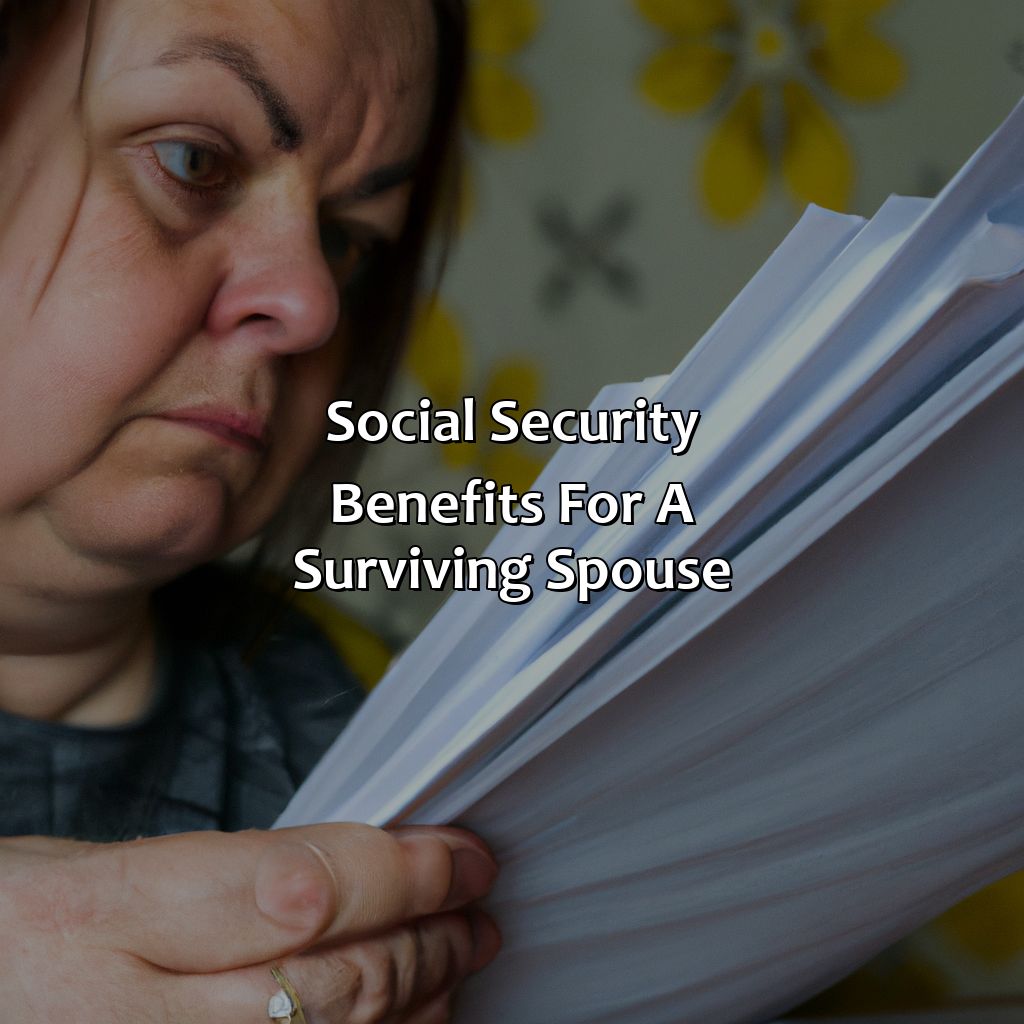What Happens To Social Security When Your Spouse Dies?
Key Takeaway:
- Qualifying for benefits: To receive Social Security survivor benefits, you must meet certain eligibility criteria, including the length of your marriage, your age, and your spouse’s work history. These factors impact the amount of benefits you may receive and when you become eligible for them.
- Additional benefits: In addition to survivor benefits, surviving spouses may also be eligible for a lump sum death payment, Medicare coverage, and benefits for dependent children. These benefits vary depending on your circumstances and eligibility.
- Planning for the future: Estate planning for married couples and financial planning for surviving spouses can help ensure a more secure financial future. Consulting a Social Security advisor can also provide guidance on maximizing survivor benefits and other available resources.
Are you concerned about what will happen to your Social Security benefits if your spouse passes away? You need to be informed about how surviving spouses can continue to benefit from Social Security. In this article, we will explore how the death of a spouse affects Social Security payments.
Social Security Benefits for a Surviving Spouse
To comprehend what happens to Social Security when your partner dies, explore the section on Social Security Benefits for a Surviving Spouse. Focus on Qualifying for Benefits, Amount of Benefits Received, and Eligibility Criteria for Widow/Widower Benefits. This will assist you in figuring out the benefits you may be eligible for as a surviving spouse.

Image credits: retiregenz.com by Joel Jones
Qualifying for Benefits
To qualify for social security benefits as a surviving spouse, certain conditions have to be met. Here are the requirements for qualifying:
- Must be at least 60 years old.
- Must have been married to the deceased for at least nine months.
- Must not be remarried before reaching age 60 (or age 50 if disabled).
- Must not be eligible for equal or higher retirement benefits based on their own earnings record.
- If taking care of a child under age 16 or disabled, can claim survivor benefits regardless of age or length of marriage.
- If divorced but was married to the deceased for at least ten years and meets other criteria listed above, still qualifies for survivor benefits.
It is important to note that surviving spouses can collect only one benefit, so they must choose between their own earned benefit and the survivor benefit.
For those who meet the criteria mentioned above, it is essential to file an application with the Social Security Administration promptly. It is also important to provide all necessary documents such as birth certificates and marriage licenses.
One suggestion is to speak with a Social Security representative about your specific situation and available options. Additionally, it may be helpful to hire a financial advisor specializing in Social Security. Understanding your eligibility and filing an application accurately can help ensure you receive maximum benefits available.
When it comes to social security benefits for a surviving spouse, the amount received might not be enough to drown your sorrows in champagne, but hey, it’s still better than nothing.
Amount of Benefits Received
Social Security Benefits for a Surviving Spouse are determined based on various factors. These benefits depend on the deceased spouse’s earnings and age at death. The amount of benefits received also depends on whether the surviving spouse files for Social Security benefits before or after reaching Full Retirement Age.
- If a surviving spouse files for benefits before reaching Full Retirement Age, their payments may be reduced due to earning limits.
- Once a surviving spouse reaches Full Retirement Age, they are eligible for 100% of their deceased spouse’s benefit amount.
- Surviving spouses who have not worked and never paid into Social Security may still be eligible for benefits based on their deceased spouse’s earnings.
It is important to note that receiving other sources of income may affect the amount of Social Security benefits received by a surviving spouse. This includes pensions, annuities, and government benefits such as workers’ compensation.
In a true story, a widow was left with financial difficulties after her husband passed away suddenly. She was relieved to learn that as the surviving spouse, she was eligible for Social Security survivor’s benefits. Understanding the process helped her navigate through the complexities and receive necessary support during her difficult period.
Good news for widows and widowers: you don’t have to be a black widow to qualify for Social Security benefits.
Eligibility Criteria for Widow/Widower Benefits
To qualify for Social Security Widow/Widower Benefits, you must have been married to your spouse at the time of their death. The duration of the marriage has to be nine months or more, and both partners should not be legally divorced.
Additionally, the widowed spouse must be at least 60 years old or disabled and should not be receiving an equal or higher retirement benefit at the time of application than their deceased spouse’s benefits. To receive survivor benefits, the widowed spouse must produce a death certificate and other necessary documents.
It is essential to note that if you remarry before turning 60 (or 50 if disabled), you are no longer eligible for your first spouse’s social security benefits. However, if the new marriage ends in divorce or death, you might be entitled to apply for benefits from either the first or second marriage.
If you do not qualify for widow/widower Social Security benefits because you were divorced from your spouse, it is possible to claim spousal survivor’s benefits after your ex-spouse passes on. It usually requires that your marriage with your previous partner lasted over ten years.
To maximize survivor social security benefits’ payment amounts, ensure that both spouses have age-appropriate strategies in place when deciding what age to start collecting social security payments. Couples stand to earn more if one partner delays their Retirement Benefit Application until they are 70 while drawing spousal and/or survivorship benefits simultaneously.
If you thought applying for a job was hard, just wait till you have to apply for Social Security Survivor Benefits.
Applying for Social Security Survivor Benefits
Be aware of what you need to apply for Social Security survivor benefits after your spouse passes away. Documents? Filing for benefits? Waiting period and timeframe for payment? This section has it all! Get the info you need on documents required for application, filing for benefits, and waiting period and timeframe for payment.

Image credits: retiregenz.com by Yuval Duncun
Documents Required for Application
When applying for social security survivor benefits, a variety of documents are required to complete the application process successfully. These essential legal documents serve as proof of identity, relationship with the deceased, and other vital details that determine the eligibility for survivor benefits.
- Death certificate of the deceased spouse.
- Birth certificate of both applicant and deceased spouse.
- Marriage certificate along with a divorce decree (if applicable).
- Social Security numbers of both applicant and deceased spouse.
- Proof of income or employment history (for surviving spouses).
It is important to note that state laws and regulations might require additional paperwork to fill out the necessary forms. Therefore, make sure to research your specific region’s requirements before starting your application process.
This article focuses on ‘Documents Required for Application‘ while applying for Social Security Survivor Benefits. Without these critical documents, applicants could face delays in receiving crucial financial support during an already difficult time. Ensure you have everything necessary for a successful application by thoroughly reviewing what is needed in advance.
Don’t miss out on securing your financial future! Gather all of the documents required for social security survivor benefits now so that in times ahead, you can rely on this essential support without any worries or delays.
If life gives you lemons, file for survivor benefits and hope the government gives you some sugar to go with it.
Filing for Benefits
Filing for Social Security Survivor Benefits is a process that allows you to claim benefits after your spouse’s death. Once you notify the Social Security Administration (SSA) of your spouse’s death, they will guide you through the application process.
To apply, you need specific documents such as your spouse’s birth and death certificates, marriage certificate or divorce decree (if applicable), social security numbers, and tax returns. Additionally, the SSA may require additional documents depending on your circumstances.
It is essential to understand that different factors, like age and disability status, determine the amount of benefits payable. The SSA can provide an estimate of your potential benefits based on these factors.
To ensure a smooth filing process, we recommend considering reaching out to a financial advisor who can assist in identifying any other eligible survivor benefits programs. Advisors can also give guidance on how best to manage benefits payouts as part of overall financial planning strategies.
Proper documentation and understanding eligibility are crucial when filing for Social Security Survivor Benefits. Working with a financial expert can ensure that you receive the maximum benefit available while also creating a comprehensive retirement plan for staying financially secure.
When it comes to Social Security survivor benefits, the waiting period might make you feel like the one who’s passed away.
Waiting Period and Timeframe for Payment
Following the loss of your spouse, a period of waiting is observed before receiving Social Security Survivor Benefits. The timeframe for payment varies based on certain factors, including eligibility and when application is filed.
When eligible for benefits, receiving payments may vary depending on whether you file online or in-person. Online applications tend to process faster than those made in person, often resulting in prompt payment. For those who prefer to apply in person, it generally takes longer as scheduling appointments and traveling to the office take time.
It’s important to note that if any errors occur in the processing of your application or if additional verification is required, there may be delays in payment. Communication with a representative throughout the process can help minimize delays.
Pro Tip: Applying online can save time and reduce errors due to its streamlined process and regular prompts for necessary information.
Who says there’s no perks to being a widow? Check out these additional benefits for surviving spouses.
Additional Benefits for Surviving Spouses
After the passing of your partner, you may be eligible for ‘Additional Benefits for Surviving Spouses’. Read the article “What Happens to Social Security When Your Spouse Dies?” It has three sub-sections:
- Lump Sum Death Payment
- Medicare Eligibility for Surviving Spouses
- Benefits for Dependent Children
These can provide you with valuable information.

Image credits: retiregenz.com by James Duncun
Lump Sum Death Payment
When a loved one passes away, Social Security offers a one-time payment to offset funeral expenses and other costs. This payment is known as the Final Benefit Payment.
This lump sum payment is available to surviving spouses who have been living with their partner at the time of death or were receiving benefits based on their partner’s work record. The payment amount may vary but typically equals the deceased’s three months’ worth of Social Security benefits.
In addition to the Final Benefit Payment, surviving spouses are also eligible for ongoing monthly benefits based on their partner’s work history. These benefits are calculated based on the deceased’s earnings over their lifetime and can provide significant financial support to surviving spouses.
It’s important to note that in order to receive these additional benefits, surviving spouses must meet certain eligibility requirements and file timely claims with Social Security. Seeking assistance from a knowledgeable professional can ensure that all necessary steps are taken and help maximize available benefits.
Overall, while losing a spouse is never easy, understanding the resources available through Social Security can provide much-needed financial assistance during this difficult time.
If only Medicare covered the cost of a new spouse after the old one dies.
Medicare Eligibility for Surviving Spouses
Once a spouse dies, the remaining spouse may be eligible for Medicare benefits. These benefits can include hospital insurance and medical insurance. They will need to apply for these benefits and meet certain eligibility requirements.
If the surviving spouse is 65 or older, they may be automatically enrolled in Medicare Part A and B. If they are under 65, they will need to apply for Medicare based on their disability status. In either case, they will need to pay appropriate premiums for their coverage.
It’s essential to note that not all surviving spouses are entitled to these benefits. To be eligible, the surviving spouse must have been married for at least ten years before their spouse died and not have remarried before age 60.
Pro Tip: It’s crucial to understand your eligibility requirements for Medicare as a surviving spouse to ensure you receive the benefits you’re entitled to.
Sure, your spouse may have left you, but at least your kids can still get some benefits from the government.
Benefits for Dependent Children
Dependent Children’s Benefits are essential for the well-being of families that have lost a breadwinner. The benefits aim to provide financial support to affected children.
- Children must be under 18 years of age, or 19 if still attending secondary school.
- If the child is disabled, they may continue receiving support even after the age limit.
- The amount paid depends on various factors such as the deceased parent’s earnings record and social security contribution.
- Stepchildren and adopted children may also qualify for benefits.
- In cases where there are more than one eligible child, each child receives a percentage of the total family benefit.
- The benefits may stop when the dependant children marry or start working.
It’s worthy to note that some states may offer additional support programs for dependent children and should be explored.
Failing to claim these benefits is unnecessary and devastating for children in need. Ensure you apply timely.
Looks like in the game of love, you either win big or lose it all – especially when it comes to social security survivor benefits and remarriage.
Impact of Remarriage on Social Security Survivor Benefits
Unravel the mysteries of how your remarriage impacts your social security survivor benefits!
Take a look at the subsections below. Get to know how your benefits may alter for the surviving spouse. Also, find out if the remarried widow/widower is eligible for benefits. Lastly, discover what benefits are available for a surviving divorced spouse.

Image credits: retiregenz.com by David Jones
Effect on Benefits for the Surviving Spouse
When a spouse dies, the surviving spouse may be entitled to survivor benefits from Social Security. The benefit amount depends on various factors such as age, work history, and marital status.
If the surviving spouse remarries before reaching age 60, they cannot collect survivor benefits based on their former spouse’s work record. However, if they remarry after 60, they can still receive those benefits. It is important to note that if the surviving spouse is eligible for their own retirement benefits, they can choose to switch between their own benefits and survivor benefits as per the circumstances and whichever pays higher. Additionally, if the surviving spouse has children who are under 18 or disabled before turning 22 years old, they too could also be eligible for additional survivors’ benefits.
One instance dates back to a few decades ago when a wife was left to raise her three children alone after her husband passed away unexpectedly. She received survivor benefits from Social Security until she decided to remarry before she turned 60 years old. However, after divorcing this man shortly thereafter and remaining unmarried since then, she realized that she was now eligible for significant survivor benefits once again due to her previous husband’s work history.
Looks like marriage is not just till death do us part, but also till your social security benefits run out.
Eligibility of Remarried Widow/Widower for Benefits
Surviving spouses who have remarried may be eligible for Social Security survivor benefits if the marriage occurred after they turned 60 or age 50 if disabled. However, benefits from a previous marriage will end upon remarriage unless the subsequent marriage ends. The surviving spouse may receive either their own benefits or the deceased spouse’s benefits, whichever is higher. In cases of divorce, the ex-spouse may also be eligible for survivor benefits if they were married to the deceased for at least ten years.
Pro Tip: It’s important to keep track of any changes in marital status and notify Social Security promptly to ensure you are receiving all eligible survivor benefits.
Looks like the only thing worse than a divorce is missing out on those sweet, sweet survivor benefits.
Benefits for a Surviving Divorced Spouse
Survivor benefits for a divorced spouse can have a significant impact on their financial stability after their ex-partner passes away. Here are the benefits that they can receive:
- If the marriage lasted for at least ten years, the surviving divorced spouse is eligible to receive up to 50% of their ex-partner’s full retirement benefit amount.
- Their own Social Security retirement or disability benefits will not be affected by receiving these survivor benefits.
- If the surviving divorced spouse remarries, they will generally lose eligibility for these survivor benefits unless their subsequent marriage also ends by death or divorce.
It’s essential to understand that even if you were divorced from your ex-partner, you could still be eligible for survivor benefits under specific circumstances. For instance, suppose you are at least 62 years old and have been divorced for at least two years before your ex-spouse dies. In that case, you may be eligible for these benefits.
Pro Tip: If you’re a divorced spouse who is unsure about your eligibility or has questions about how your benefits will work, it’s vital to speak with a Social Security representative who can provide personalized guidance.
Remember, the only thing more unpredictable than the future is your ex-spouse’s dating habits.
Planning for the Future
Explore Estate Planning, Financial Planning and Social Security Advice for Married Couples. Understand the future implications of a spouse’s passing. ‘What Happens to Social Security When Your Spouse Dies?’ Dive into the sub-sections for more insight. Be prepared for the financial consequences.

Image credits: retiregenz.com by James Woodhock
Estate Planning for Married Couples
Estate Management for Married Partners involves careful planning of jointly owned property, assets, and other family contributions. This ensures proper regulation of funds and allocation in the event of one individual’s passing. In addition to limiting the potential legal battles that may arise, it helps maintain a well-organized inheritance process.
Designing an estate plan inevitably requires a considerable discussion between couples which primarily revolves around aspects such as final wishes on health care, preservation of assets for the future generation and succession planning ensuring estate taxes are minimized. It is sensible to analyze your assets carefully during this practice to ensure that you are taking all the necessary steps to provide for yourself or your beneficiaries after the death of your spouse. It can serve as solid ground for trust formation and elimination of emotional turmoil amidst grief later on.
Pro Tip: Doing thorough research regarding laws that may affect your estates before establishing a plan can be highly advantageous and help you make informed decisions.
Remember, when planning for your financial future as a surviving spouse, it’s important to have a backup plan for when your backup plan inevitably fails.
Financial Planning for Surviving Spouses
Surviving spouses may face significant financial difficulties after the loss of their partner. Proper financial planning is essential to ensure that they can sustain their lifestyle and meet their future expenses. This may involve seeking professional advice, reviewing social security benefits, and assessing the sources of income and assets available.
Many surviving spouses may be eligible for social security benefits; however, the amount of benefit they are entitled to receive depends on several factors like age, family history, and work history. They can also claim retirement benefits or survivor’s benefits depending on which is higher. Additionally, it is crucial to understand how social security works in terms of taxes and also explore alternative sources of income such as life insurance policies.
It is also essential to understand the impact of taxes on various assets transferable from the deceased partner. Avoiding common mistakes such as placing all funds into a joint account or changing beneficiaries too soon should be avoided without thorough research.
One suggestion is to take advantage of certain tax deductions through IRA contributions for up to six years; this allows surviving spouses with lower incomes to use joint tax returns until retirement age slowly. It is advisable that surviving spouses assess their expenses carefully before making any major decisions and consider cutting back where possible.
Consulting a Social Security Advisor for Guidance.
When it comes to handling your social security benefits after the loss of a spouse, seeking the guidance of a knowledgeable and experienced social security advisor is highly recommended. An expert in this field can provide you with valuable insight on how to navigate the complex rules and regulations surrounding social security benefits during times of bereavement.
In particular, a social security advisor can assist you in determining which benefits you are entitled to receive and when you should begin receiving them. They can also advise you on how to maximize your benefits while minimizing taxation, as well as answer any questions or concerns that may arise throughout the process.
It’s important to remember that every situation is unique, and there is no one-size-fits-all approach to handling social security benefits after the death of a spouse. Therefore, consulting with an advisor who has experience working with clients in similar situations can be extremely beneficial.
Research conducted by Forbes found that 96% of Social Security recipients are receiving reduced payments due to Social Security “timing mistakes.” Be sure to consult with an experienced Social Security Advisor before making any decisions regarding your retirement plan.
Five Facts About Social Security When Your Spouse Dies:
If you were married for at least 9 months and your spouse dies, you may be eligible for survivor benefits. (Source: SSA.gov)
Survivors can receive up to 100% of their deceased spouse’s social security benefit. (Source: AARP)
The age at which you claim survivor benefits can affect the amount you receive. (Source: The Balance)
Survivor benefits can be reduced if you claim them before your full retirement age. (Source: Investopedia)
If you have children under 18, they may be eligible for benefits as well. (Source: SSA.gov)
FAQs about What Happens To Social Security When Your Spouse Dies?
What happens to social security when your spouse dies?
When a spouse dies, their Social Security benefits may be transferred to the surviving spouse under certain circumstances.
What benefits are available to a surviving spouse?
A surviving spouse may receive a one-time death benefit of $255. They may also be entitled to survivor benefits, which are generally equal to the deceased spouse’s benefit amount.
What if the surviving spouse is already receiving their own Social Security benefits?
The surviving spouse can only receive one Social Security benefit at a time. If their own benefit is higher than the survivor benefit, they will continue to receive their own benefit.
What if the surviving spouse remarries?
If the surviving spouse remarries before the age of 60, they are not eligible for survivor benefits. If they remarry after the age of 60, they may be eligible for benefits based on their new spouse’s Social Security record.
What if the deceased spouse was receiving disability benefits?
If the surviving spouse is caring for a child under the age of 16, they may be entitled to survivor benefits even if the deceased spouse was receiving disability benefits.
What if the surviving spouse is not a U.S. citizen?
Surviving spouses who are not U.S. citizens may still be eligible for survivor benefits, as long as they meet the eligibility requirements.
 Checkout this IRS Loophole
Checkout this IRS Loophole 
